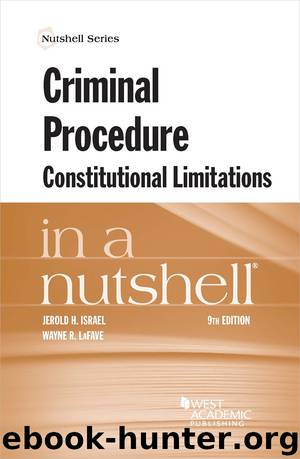Criminal Procedure, Constitutional Limitations in a Nutshell by Jerold H. Israel & Wayne R LaFave

Author:Jerold H. Israel & Wayne R LaFave
Language: eng
Format: epub
ISBN: 9781684672547
Publisher: West Academic
Published: 2019-03-05T16:00:00+00:00
(a)From Weeks to Mapp
The Fourth Amendment exclusionary rule dates back to a period marked generally by relatively narrow readings of the Fourth Amendment, but it remains today, even after the adoption of a far more expansive view of the Amendment. The 1914 decision 275
in Weeks v. U.S. established the exclusionary rule as the governing standard for federal courts. Weeks held that evidence obtained by federal officials in violation of the Fourth Amendment would be barred from a federal prosecution. To rule otherwise, the Court noted, would be “to affirm by judicial decision a manifest neglect if not an open defiance of the prohibitions of the Constitution.” Six years later, in Silverthorne Lumber Co. v. U.S., 251 U.S. 385 (1920), Justice Holmes added that without the remedy of exclusion, the Fourth Amendment would be reduced to “a form of words.” Despite this strong language, the Weeks rule reflected at the time a distinctly minority position in the interpretation of fundamental law governing searches and seizures. A substantial majority of state courts, interpreting state constitutional provisions identical to the Fourth Amendment, refused to adopt an exclusionary rule. The most widely cited criticism of the “federal position,” that by Justice Cardozo (then a state court judge), characterized Weeks as permitting the “criminal * * * to go free because the constable has blundered.”
Since the Fourth Amendment did not apply to the states, the state courts could reject the exclusionary rule so long as their admission of illegally seized evidence did not violate due process under the then prevailing “fundamental rights” interpretation of the Fourth Amendment. See § 1.2(b). Although the Court was moving at the time toward a broader reading of the fundamental rights concept, and although it acknowledged that Fourteenth Amendment due process encompassed the “security of one’s privacy 276
which is at the core of the Fourth Amendment,” Wolf v. Colo., 338 U.S. 25 (1949) held that the Fourteenth Amendment did not require states to exclude evidence obtained through an unconstitutional search. The Wolf opinion noted that the Weeks exclusionary rule was “not derived from the explicit requirements of the Fourth Amendment,” was not followed in “most of the English-speaking world,” and had been expressly rejected in 30 states. In 1961, with the Court moving toward the adoption of the selective incorporation doctrine (see § 1.2(b)), Wolf was overruled in Mapp v. Ohio, 367 U.S. 643 (1961). A case marked like Wolf itself with sharp dissents, Mapp held that “all evidence obtained by searches and seizures in violation of the Constitution is, by that same authority, inadmissible in a state court.”
Justice Clark’s opinion for the Court in Mapp contained an extensive discussion of the justifications for requiring exclusion of unconstitutionally seized evidence even though that evidence was likely to be reliable and relevant to proof of guilt. Prior to Mapp, Supreme Court opinions had suggested as many as five different justifications for the Weeks rule, and each of these found at least oblique support somewhere in the Mapp opinion. The five justifications
Download
This site does not store any files on its server. We only index and link to content provided by other sites. Please contact the content providers to delete copyright contents if any and email us, we'll remove relevant links or contents immediately.
The New Jim Crow: Mass Incarceration in the Age of Colorblindness by Alexander Michelle(848)
The Complete Idiot's Guide to Forensics by Alan Axelrod(837)
A New Kind of Monster: The Secret Life and Shocking True Crimes of an Officer . . . And a Murderer by Timothy Appleby(831)
HELTER SKELTER by Vincent Bugliosi(808)
Love Behind Bars by Jodie Sinclair(795)
Ratman: The Trial and Conviction of Whitey Bulger by Howie Carr(689)
A Life and Death Decision by Scott E. Sundby(688)
Executing Freedom by Daniel Lachance(679)
A Wilderness of Error: The Trials of Jeffrey MacDonald by Errol Morris(657)
Stop and Frisk by Michael D. White & Henry F. Fradella(642)
The Killer of Little Shepherds: A True Crime Story and the Birth of Forensic Science by Douglas Starr(639)
The Central Park Five by Sarah Burns(637)
Scotland Yard Casebook by Lock Joan(635)
Homicide Special: A Year With the LAPD's Elite Detective Unit by Miles Corwin(628)
Kidnapped by a Client by Sharon R. Muse(616)
Issues and Controversies in Policing Today by Johnny Nhan(607)
Until Proven Innocent by Stuart Taylor Jr(602)
How to Beat The Police Interrogation - Learn Their Dirty Tricks & Tools by Learn Their Dirty Tricks & Tools(600)
Why Some Women Lie About Rape by Linda Fairstein(534)
